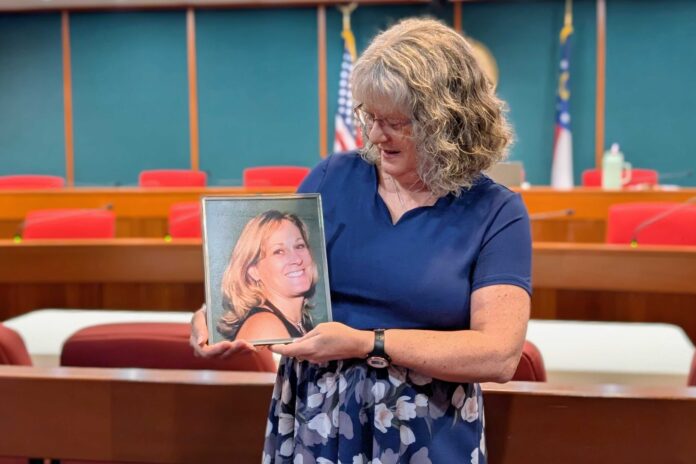
(Georgia Recorder) — For Jennifer Bullard, the decision to seek a physician-assisted death was not an act of wanting to die but of taking control over how and when she died, said Bullard’s sister, Jamie McNeil
Speaking to the Georgia House Public and Community Health Committee Monday, McNeil, shared how her sister’s ALS diagnosis progressively paralyzed her muscles, leading to “excruciating” and “brutal” suffering and that despite Bullard’s courage and her family’s round-the-clock care, could not be fully alleviated by conventional medical care. Bullard, McNeil said, was terrified of locked-in syndrome, a state of total paralysis while the mind remains conscious and alert.
“Unable to communicate, unable to speak, unable to move at all — to me, that is the very definition of torture, and my sister didn’t deserve to be tortured,” McNeil said. “Jennifer adamantly did not want to die, but she even more adamantly did not want to go through the locked-in syndrome.”

McNeil said that the medical aid in dying (MAID) option gave her sister a sense of dignity and peace, allowing her to coordinate a “beautiful passing” that included a final, intimate farewell with family and friends. After receiving the medication, McNeil said she held her sister, who peacefully passed away within minutes.
“The most harm that you could have done to Jennifer would be to have made her live out this disease in that torture,” McNeil said.
Bullard underwent the procedure in California, where it is legal, unlike in Georgia.
Committee chair Rep. Sharon Cooper, a Marietta Republican, said the purpose for the committee hearing was to learn about MAID. There has not been a bill filed in previous sessions, and it’s unclear if legislation related to MAID will be considered yet in the next session.
Dr. Adrienne Mims, a geriatrician and vice chair of the Georgia Council on Aging, described MAID as a medical choice for a terminally ill, mentally capable adult to obtain and self-administer a prescription to die peacefully. She clarified it is distinct from suicide, which she noted is a separate public health issue. Mims presented data from Oregon, where MAID has been legal since 1997, showing that while thousands of prescriptions have been written, only a fraction are used.

“It is a choice. Sometimes people feel it’s empowering to be able to have that as an option,” Mims said.
Palliative care is focused on improving a patient’s quality of life at any stage of a serious illness, while hospice is for those with a prognosis of six months or less.
Anthony Davis, a social worker in palliative care, said that a patient’s request for MAID could stem from a lack of resources rather than a true desire to die. He said that as a social worker, he is in favor of autonomy in end-of-life care, but he said that there must be “resources in place,” such as proper mental health counseling, before MAID is an option.
“Once you assess further, you find it’s not death that they’re wanting, it’s the lack of resources,” Davis said. “It’s the fact that they don’t have the things needed, whether it be transportation, whether it be food, whether it be caregiver support, sometimes it’s that they don’t even have support from their family.”
Rep. Scott Hilton, a Republican from Peachtree Corners, expressed moral discomfort about family members’ ability to “push” such an option and fear of a “perverse incentive” where insurance companies might promote MAID as a cheaper alternative to costly long-term care.

“How do we prohibit financial incentives from coming into play here, either from the family who is maybe seeking benefit from that person passing, or, for example, insurance companies who may begin to push this as a cheaper option as opposed to prolonging life?” he asked.
Rep. Dexter Sharper, a Valdosta Democrat who has worked as a paramedic for more than two decades, said that he’d much rather this be an option than hearing that a family member died by suicide because they had no other option.
“I remember all the suicides that I’ve been to as a paramedic over the last 30 years. Every last one of them, I don’t suffer with anything from it, thank God, but I remember where I was and where they did it to themselves. So those are things that you guys just have to keep in mind, there are going to be other issues that happen,” Sharper said.





